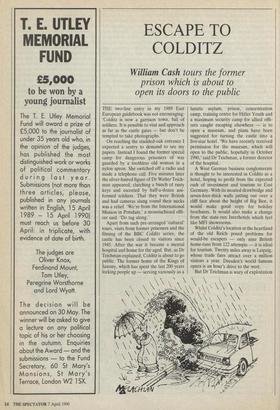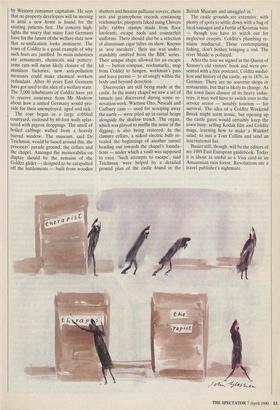ESCAPE TO COLDITZ
William Cash tours the former
prison which is about to open its doors to the public
THE two-line entry in my 1989 East European guidebook was not encouraging: `Colditz is now a garrison town, full of soldiers. It is possible to visit and approach as far as the castle gates — but don't be tempted to take photographs.'
On reaching the studded-oak entrance I expected a sentry to dernind to see my papers. Instead I found the former special camp for dangerous prisoners of war guarded by a toothless old woman in a nylon apron. She switched -off a radio and made a telephone call. Five minutes later the silver-haired figure of Dr Walter Teich- man appeared, clutching a bunch of rusty keys and escorted by half-a-dozen uni- formed soldiers. That they were British and had cameras slung round their necks was a relief. 'We're from the International Mission in Potsdam,' a moustachioed offi- cer said. 'Do tag along.'
Apart from such pre-arranged 'cultural' tours, visits from former prisoners and the filming of the BBC Colditz series, the castle has been closed to visitors since 1945. After the war it became a mental hospital and home for the aged. But, as Dr Teichman explained, Colditz is about to go public. The former home of the Kings of Saxony, which has spent the last 200 years locking people up — serving variously as a lunatic asylum, prison, concentration camp, training centre for Hitler Youth and a maximum security camp for allied offi- cers caught escaping elsewhere — is to open a museum, and plans have been suggested for turning the castle into a five-star hotel. 'We have recently received permission for the museum, which will open to the public, hopefully in October 1990,' said Dr Teichman, a former director of the hospital.
A West German business conglomerate is thought to be interested in Colditz as a hotel, hoping to profit from the expected rush of investment and tourism to East Germany. With its moated drawbridge and seven-foot-thick walls jutting out over a cliff face about the height of Big Ben, it would make good copy for holiday brochures. It would also make a change from the state-run Interhotels which feel like MFI showrooms.
Whilst Colditz's locatioh in the heartland of the old Reich posed problems for would-be escapers — only nine British home-runs from 122 attempts — it is ideal for tourism. Twenty miles away is Leipzig, whose trade fairs attract over a million visitors a year. Dresden's world famous opera is an hour's drive to the west.
But Dr Teichman is wary of exploitation by Western consumer capitalism. He says that no property developers will be moving in until a new home is found for the existing patients first. His concern high- lights the worry that many East Germans have for the future of the welfare state now that re-unification looks imminent. The town of Colditz is a good example of why such fears are justified. Its main industries are armaments, chemicals and pottery: arms cuts will mean likely closure of the munition factories; new anti-pollution measures could make chemical workers redundant. After 40 years East Germans have got used to the idea of a welfare state. The 7,000 inhabitants of Colditz have yet to receive assurance from Mr Modrow about how a united Germany would pro- vide for their unemployed, aged and sick.
The tour began in a large cobbled courtyard, enclosed by 60-foot walls splat- tered with pigeon droppings. The smell of boiled cabbage wafted from a heavily barred window. The museum, said Dr Teichman, would be based around this, the prisoners' parade ground, the cellars and the chapel. Amongst the memorabilia on display should be the remains of the Colditz glider — designed to be catapulted off the battlements — built from wooden shutters and hessian palliasse-covers; chess sets and gramophone records containing reichsmarks; passports faked using Chivers jelly; rubber stamps made from floor linoleum; escape tools and counterfeit uniforms. There should also be a selection of aluminium cigar tubes on show. Known as 'arse sneakers', their use was under- standably omitted from the BBC series. Their unique shape allowed for an escape kit — button compass, reichsmarks, map from Colditz to Sengen, workman's pass and leave permit — to sit snugly within the body and beyond detection. Discoveries are still being made at the castle. In the musty chapel we saw a set of tunnels just discovered during some re- novation work. Wartime Oxo, Nescafe and Cadbury cans — used for scooping away the earth — were piled up in casual heaps alongside the shallow trench. The organ, which was played to muffle the noise of the digging, is also being restored. In the clammy cellars, a naked electric bulb re- vealed the beginnings of another tunnel heading out towards the chapel's founda- tions — under which a vault was supposed to exist. 'Such attempts to escape', said Teichman 'were helped by a detailed ground plan of the castle found in the British Museum and smuggled in.'
The castle grounds are extensive, with plenty of spots to settle down with a bag of local sausages and a bottle of Krontau wine — though you have to watch out for neglected cesspits. Colditz's plumbing re- mains mediaeval. Those contemplating fishing, don't bother bringing a rod. The river Mulde is polluted.
After the tour we signed in the Queen of Saxony's old visitors' book and were pre- sented with a free postcard, Colditz medal- lion and history of the castle, up to 1876, in German. There are no souvenir shops or restaurants, but that is likely to change. As the town faces closure of its heavy indus- tries, it may well have to switch over to the service sector — notably tourism — for survival. The idea of a Colditz Weekend Break might seem ironic, but opening up the castle gates would certainly keep the town busy: selling Kodak film and Colditz mugs, learning how to make a Waldorf salad, to mix a Tom Collins and send an international fax.
Busier still, though, will be the editors of my 1989 East European guidebook. Today it is about as useful as a Visa card .in an Amazonian rain forest. Revolutions are a travel publisher's nightmare.



























































 Previous page
Previous page